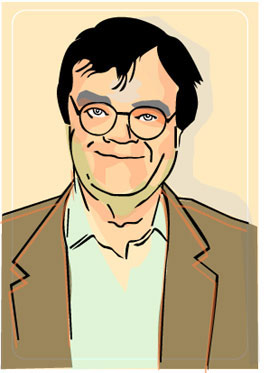My sandy-haired gap-toothed daughter likes to snap my picture on a cellphone as I’m eating my bran flakes in the morning and brooding over the front page of the Times, over which there is now more to brood than ever. She is 8 and she looks stunning in pictures, and I look stunned, as if someone had just clubbed me with a baseball bat. “Smile,” she says, and I try, but still I look like an ugly white person who is fixing to die or something.
My grandmother hated cameras and we have the pictures to prove it. She stands by the back door of the little white frame house, on her way to pick beans into a pail, wearing a loose cotton dress, her hair up in a bun, a few strands loose, wire-rim glasses, cotton stockings and old shoes, and she gives the camera a sour look that says, “Oh for pity’s sake. Why are you bothering me with that?” She was a sweet grandma and deeply loved, so we wanted pictures to remember her by, but in those pictures she is deeply irked, which she was not otherwise. The medium shapes the message.
In Grandma’s day, you were photographed as an infant, and again as a child, seated on a pony, and then at your wedding, and occasionally with your family, all of you sitting straight and stiff as judges at a hanging. Then came the Kodak, which opened the door to the commemoration of daily life, the family gallery on the refrigerator door, and now here is the cellphone. Instant gratification. Snap and look.
Understand now, the camera is the source of celebrity in our time. The recording business has splintered into hundreds of niches — there will never be another Frank or Elvis, voices whom everybody knew — and literature is so devalued, it simply doesn’t matter to many people. The only true celebrities are movie stars; if you spotted them on the street, you would stop in slack-jawed amazement and take a deep breath. Only the camera bestows this enormous asset that raises you up out of the struggle and strife and into a special club where you enjoy free food and rides and extensive fawning and truckling.
The dark side of celebrity is, like the sex appeal of teenagers and the meaningfulness of country music, somewhat exaggerated. Occasionally, a celeb becomes Bailey’s Irish Cream-dependent and is shipped off to Hazelden, or makes lousy investments and is forced to do infomercials for vitamins, but by and large it’s not a bad life if the camera loves you.
But the camera can be fearfully truthful. Look at the picture of the Current Occupant, reading a speech to the troops at Camp Pendleton, wearing a zip-up jacket with little epaulets on the shoulders, a presidential seal sewn on the right breast, and on the left breast the words “George W. Bush, Commander in Chief.” Is this for his benefit or that of the troops? No president ever needed to wear a name tag before. He is the first. Insecurity is written all over him. Look at Dick Cheney. No need for a name tag there.
A man has reason to be shy about cameras, but I just take off my specs and I am OK. If you can’t see people, then you don’t feel they can see you either. The world is beautiful, like an impressionist painting. The neighbor’s backyard becomes Monet’s garden. My eyesight is such that people who try on my glasses feel dizzy afterward and have to lie down in a dark room, so when I take them off, the world blurs in a beautiful way and the imagination stirs in the form of neuron impulses in the neocortex, and looking at a Dumpster, I remember a house I lived in once with a broad porch looking out on a waterfall. The amygdala, the part of the brain that gives emotional meaning to memories, paints the porch shining and golden.
Meanwhile, the Renoir woman I am married to says, “Put on your glasses. You look distinguished with them on.” I have no interest in being distinguished, but I put on my glasses. Goodbye, amygdala, and hello, real world. Good morning, Iraq and tortured prisoners hijacked to Syria and the war crimes committed by our own officials. One can escape at the movies or in Monet’s garden, but these crimes won’t stay hidden. There were photographs of Abu Ghraib. There are cellphones everywhere. People are taking photographs of almost everything nowadays.
– – – – – – – – – – – –
(Garrison Keillor’s “A Prairie Home Companion” can be heard Saturday nights on public radio stations across the country.)
(c) 2006 by Garrison Keillor. All rights reserved. Distributed by Tribune Media Services, INC.


